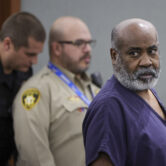CHARLESTON, S.C. (CN) — Alex Murdaugh, the scion of a legal dynasty that wielded power for nearly a century in the Palmetto State's Lowcountry, was found guilty Thursday night in the brutal murders of his wife and son.
News of verdict arrived before 7 p.m. Thursday — a little less than three hours after deliberations began in a trial that stretched on for more than a month. The defendant was stone-faced as the verdict was read. He slightly nodded his head as a court clerk read the guilty verdicts to two counts of murder and two firearm offenses.
Judge Clifton Newman denied a final motion from Murdaugh's defense attorneys seeking to vacate the convictions. He decided to delay sentencing until Friday morning.
South Carolina Attorney General Alan Wilson said in a press conference outside the Colleton County Courthouse that prosecutors poured their "blood, sweat and tears" into the case as they worked to give a voice to the victims — Maggie and Paul Murdaugh.
"We can’t bring them back, but we can bring them justice," he said.
Creighton Waters, the lead prosecutor on the case, said justice was done that night.
“It doesn’t matter who your family is," Waters said. "It doesn’t matter how much money you have, or people think you have. It doesn’t matter how prominent you are. If you do wrong, if you break the law, if you murder — then justice will be done in South Carolina.”
He declined to answer questions about sentencing.
In his closing arguments, defense attorney Jim Griffin vainly excoriated the missteps in the double murder investigation that compounded as the 54-year-old ex-attorney became the sole suspect in his wife and son’s slayings.
A state prosecutor parried the defense’s final attacks in rebuttal arguments before the jurors were charged with making “one of the most important decisions” of their lives in a case that has absorbed the nation’s attention.
Murdaugh admitted last week on the witness stand he lied, cheated and stole. He confessed to abusing powerful narcotic drugs and staging his own suicide in an attempt to fleece his insurance company. He robbed his former law clients and stole from the family’s century-old law firm, causing the business to collapse in scandal.
But as defense attorney Jim Griffin reminded the jury in closing arguments, the defendant was not on trial for any of those crimes.
Murdaugh was charged with the murders on allegations he fatally shot his wife and youngest son the night of June 7, 2021, at the family’s hunting estate in Colleton County.
The ginger-haired ex-attorney called 911 shortly after 10 p.m. to report finding the bodies near the estate's dog kennels. Sheriff’s deputies who first arrived discovered one of the community's most prominent men in the midst of a gruesome crime scene that was called a “butchering” by defense attorney Dick Harpootlian.
The 22-year-old son was blasted twice by a shotgun loaded with buckshot and steel birdshot. The buckshot peppered his chest while the birdshot blew his blood and brains across the kennel's feed room. Maggie was shot at least four times with a .300 blackout rifle not far from her son. The final shot was to the back of the 52-year-old woman’s head.
Jurors toured the hunting estate on Wednesday morning. The feed room’s window was still cracked from the gunfire that echoed across the 1,772-acre estate that night, photos show. A plant pot with the name of Murdaugh’s eldest son, Buster, sat on the porch of the family's cream-colored house nestled among the pines and marshlands in the rural Lowcountry.









